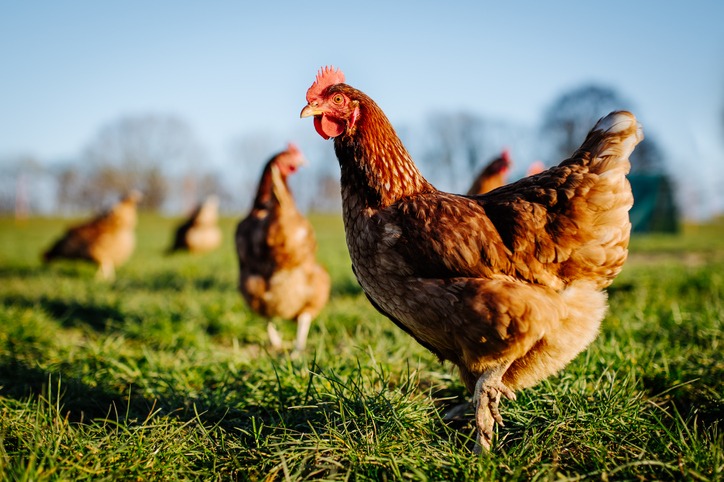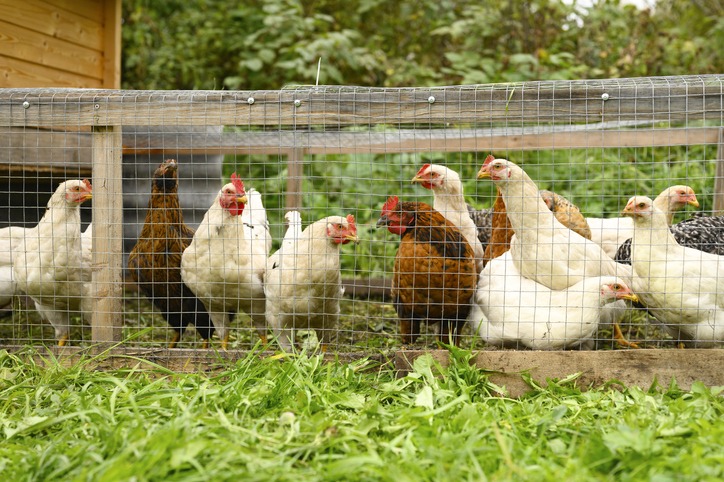Chickens are smart animals. It’s not common to describe them as smart, because saying a person has a “bird brain” means they are stupid. But do you know that cognitive research has shown that chickens can be trained to be smarter than cats, dogs, or even toddlers? This shows that chickens have a lot of cognitive abilities and are actually smart creatures.
Chickens are entertaining and useful (if you raise them to lay eggs and be meat), but training them can both be fun and functional for any chicken keeper. It helps make your tasks easier and is a fun challenge that you can embark on.
Luckily, chickens are creatures of habit and that’s an advantage if you want to train them. They are motivated by their desire to eat and are keen on eyesight. While chickens may be unable to learn tricks like a parrot or become obedient like a dog, there are certain things you can teach them. By training your flock, you can have them respond to you and behave for you as you wish.
Training chickens work better with a smaller-sized flock fewer than ten chickens. The more chickens you have, the harder it is to manage them. But it’s not impossible, especially if you’re not the only one training them.
Before you start training, establish a routine with your chicken flock.
Chickens train best when you have a set schedule that you can incorporate the learning of tricks into. Be sure to do tasks such as opening their coop, putting out their feeder bucket, or cleaning their litter box at the same time every single day.
Here are some of the ways you can train your chickens:
Teaching them to return to the coop
The only sure-fire way to get your chickens back to the safety of your coop is to let them think it was their idea in the first place. Since chickens are creatures of habit, you just need to have them know where their roost is, and they will return to it every night, like clockwork.
The first thing to do is to keep your new chickens in the coop for a week to ten days. Let all they need be there. The chicken will not think that the coop is their home. Then, start letting them out the same time every morning to feed and to roam around. Watch and see that they will return to their roost in the evening. Close the coop at the same time every night.
By establishing this routine, your chickens will be trained to return to their resting place every night and you won’t have to herd them or run after them to get them to go into their roost.
Teaching them to come to you when you call
Having the ability to call your flock to the coop in a free-ranging situation is important and invaluable in some situations.
To get chickens up and running when you call, use food. They are always motivated by their need and desire to eat. Scatter some treats in the run where the hens are, and either shout something or use a bell, whistle, or a small gong (as long as it’s not too loud) and they will soon associate that call with the food that awaits them.
To teach chickens to come on command, follow these steps:
1. Stand in view of your flock, while you hold their favorite treats in your hand at their eye level. Choose a treat that they love.
2. Wait for the dominant hen or the best forager to see the treats in your hand and come running to you. The rest of the chickens will follow.
3. While the chickens are eating out of your hand, make your signal. Use that consistently, as this noise will be the signal for your flock to come to you when you hear it.
4. Repeat steps 1 to 3 every day over a period of time. This will reinforce that the chickens would receive a treat if they come to you after you make your signal.
This technique is useful if you want to lure them on a set of scales for weigh in, or if you need to call a chicken who looks ill or injured. Call, whistle, or ring a bell as usual – and the birds will come flapping your way eagerly.
This trick can also be super useful in times of emergency. See a predator lurking, calling out to your chicken can help save them from the jaws of wolves and more.
Teach them to come home for dinner
If it’s nighttime and your chickens are not yet inside the coop, you can train them to go home every night. You can use bells, whistles or your own voice, and the chickens can associate it with goodies. They will come running to see what’s for dinner.
So, if your chickens are not all tucked in and you want to close the coop so you can rest for the day, start treat-training them paired with a signal. To do this:
1. Use your chosen signal (a command with your voice, a whistle, a bell, etc.) when your chickens are heading to the roost. Present the feed or treats inside their coop.
2. Do this every day until all you have to do is to sound your signal and your chickens will come running straight to the coop.
This technique works best if you always give their feed in the coop. If you just sprinkle it around and try to urge them inside the coop, the chickens will see what you are up to and they will outsmart you.
Herding your chickens
Herding is an important behavior to teach to a young flock. To make free-ranging chickens go in the direction you want them to, here’s how to do it:
1. Stand behind your flock and gently clap your hands together. A gentle clap is usually more effective than a loud clap. Your flack will start to move in a formation towards the direction you want to go.
2. If your flock starts veering away from the target, use your arms as guiding rudders. Use a single arm stretched out in the direction they’re going. They will see your arm and adjust to the direction you are herding them to.
It’s important to start this herding technique when your flock is young, because older chickens may not be as teachable as the young.
It can happen that one or two chickens may break out from the formation and start running amok. However, if you respond immediately and put your arm out to reform the transformation, the chickens will reform the formation.
Such techniques are best for smaller chicken flocks. Usually 10 or less.
FAQs: How to Train your chickens?
1. Are chickens easy to train?
Chickens are not only easy to train but they are also a lot of fun to train. If you have ever trained a dog, rest assured, you will be able to train chickens with ease. They are known to be easier to train than dogs because they are very motivated by food. All you need is a hungry chicken and the training will be easier than anything. You can use chicken feed or pellets to train your chickens.
2. What tricks can I teach my chicken?
There are many tricks that you can teach your chicken such as following the feeder. This is a neat little trick that will avoid you having to herd your chickens and instead have them come to you. Eating from your hand is another trick that you can teach your chicken. This trick is a good way to bond with your chicken and show your affections.
Other fun tricks that you can teach your chicken are to ride a bicycle or to jump for a treat. They are not as functional but still super fun both for you and your chicken.
3. How do you start training a chicken?
To start training a chicken, first and foremost, you need a chicken. You can easily obtain one from a poultry farm. However, you must know poultry farming before you buy a chicken because you should be capable enough to take care of your feathery friend. Secondly, you should feed your chicken plenty and ensure it is healthy.
After all the basics are complete, you can go ahead and try training your chicken near feeding time so that it is hungry and hence more susceptible to the tricks you want to teach it.
4. Can you teach a chicken its name?
Yes, you can easily teach a chicken its name. This does not even require proper training. All you have to do is repeat their name to them from when they are chicks. However, chickens are not like dogs and will not come running when you call for them. They will turn around and acknowledge you though if you call their name.
Conclusion:
Chickens are known to have a mind of their own and they can be flighty at times. However, if you take out some time and put in the effort to train them, they can be quite fun to be around and easy to handle. Chickens are unlike any other animal but they can still be trained to do small tricks that can help you out.


